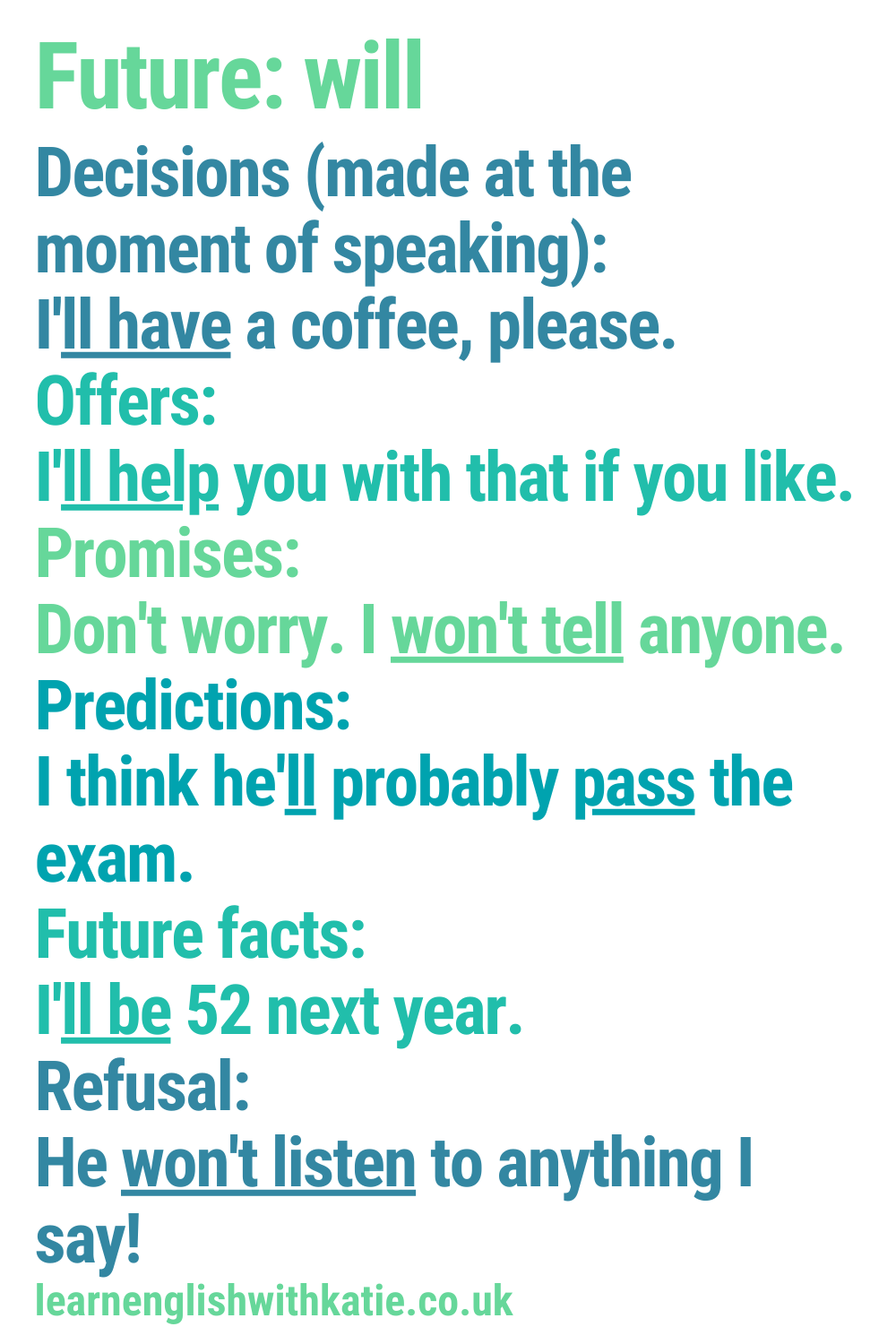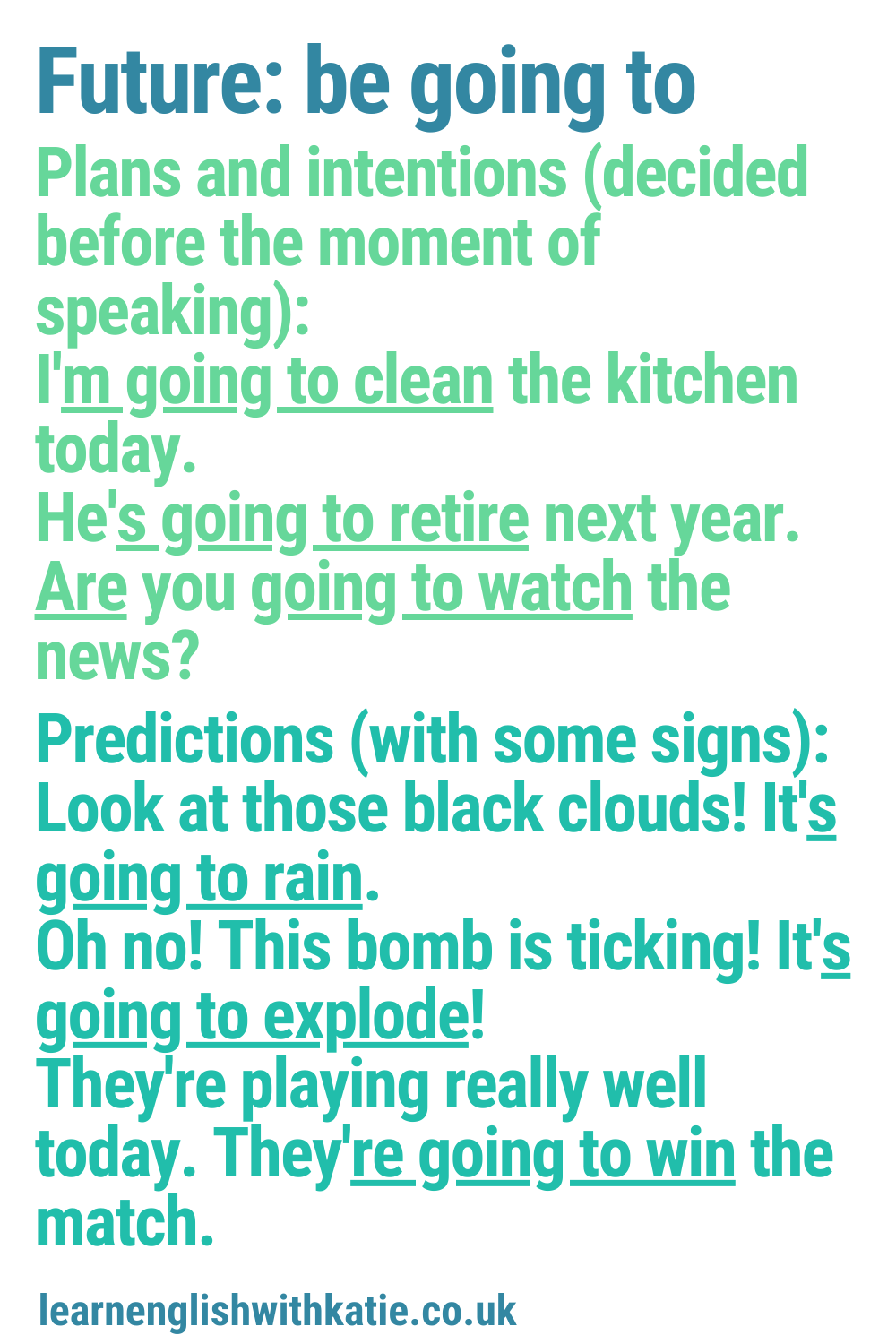|
We don't really have a future tense in English but instead use a variety of different structures. The most common are "be going to", "will", present continuous and present simple but do you know the difference? Keep reading to learn more about the different future forms in English. Will Formation will + infinitive Positive I / you / he / she / it / we / they will work (I'll / you'll / he'll / she'll / it'll / we'll / they'll work) Negative I / you / he / she / it / we / they will not work (I / you / he / she / it / we / they won't work) Question Will I / you / he / she / it / we / they work? Uses 1. Decisions (made at the moment of speaking): (In a café) I'll have a coffee and a chocolate muffin, please. He's in hospital?! Oh no! I'll go and see him tomorrow. 2. Offers: I'll help you with your homework if you like. Don't worry. We'll look after your cats while you're on holiday. Note: We use "shall" instead of "will" for a question with "i" and "we". Shall I carry some of those books for you? 3. Promises: I'll have my report on your desk by lunch time. Don't worry. I won't tell anyone. 4. Predictions: I think he'll probably pass the exam. Do you think we'll be able to live on the moon one day? 5. Future facts: I'll be 52 next year. The sun will rise at 5.32 tomorrow morning. 6. Refusal or insistence: He won't listen to anything I say! I won't go out with him, no matter how often he asks me! Be going to Formation am/are/is going to + infinitive Positive I am going to work, you / we / they are going to work, he / she / it is going to work (I'm going to work, you're / we're / they're going to work, he's / she's / it's going to work) Negative I am not going to work, you / we / they are not going to work, he / she / it is not going to work (I'm not going to work, you / we / they aren't going to work, he / she / it isn't going to work) Question Am I going to work? Are you / we / they going to work? Is he / she / it going to work? Uses 1. Plans and intentions (decisions made before the moment of speaking): I'm going to clean the kitchen today. He's going to retire next year. Are you going to watch the news? 2. Predictions (based on signs or evidence): Look at those black clouds! It's going to rain. Oh no! This bomb is ticking! It's going to explode! They're playing really well today. They're going to win the match. Present continuous We use the present continuous to talk about plans and arrangements, such as appointments, things we have a date and time for and might write on our calendar. For example: I'm seeing the doctor at 4 tomorrow. We’re meeting outside the cinema at 6.30. See this post for more information about the present continuous. Present simple We use the present simple to talk about timetabled events. For example: Our train leaves at 7.30 tomorrow. The film starts at 6 o’clock. I have an English lesson at 5.30 this afternoon. See this post for more information about the present simple. Would you like more lessons, as well as tips for learning English, sent straight to your email inbox? Click the button and sign up:
3 Comments
maria
28/10/2023 05:28:14 pm
Hey there! I have a question about this, maybe you can help me. I understand the difference between will and going to regarding the moment in which you make the decision.
Reply
Katie
9/11/2023 04:17:37 pm
Hi Maria,
Reply
Your comment will be posted after it is approved.
Leave a Reply. |
About the blogFollow the blog for mini lessons and tips on how to improve your English. Categories
All
Archives
July 2024
|


 RSS Feed
RSS Feed
